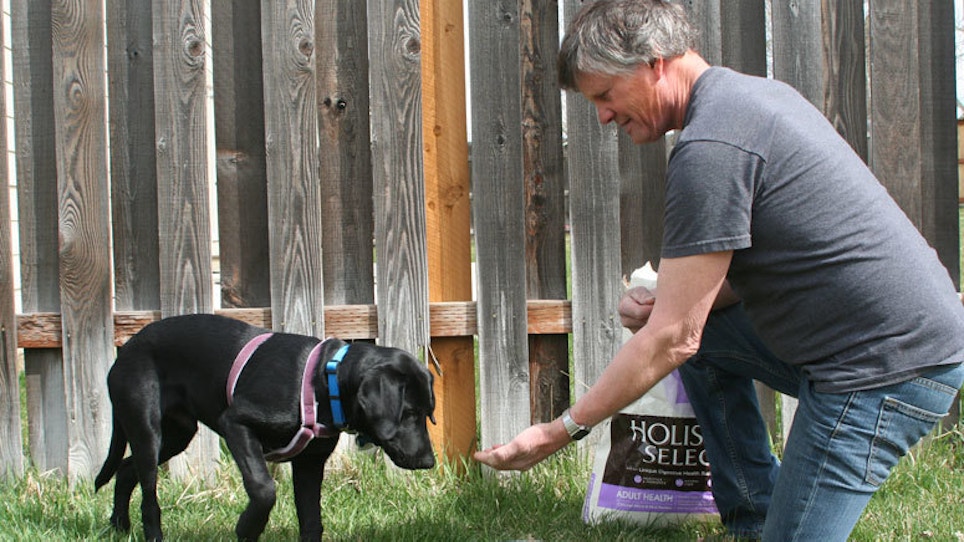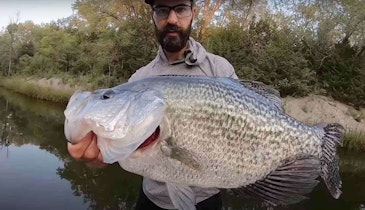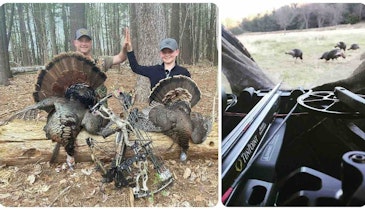How often should you feed your hunting dog? Is there an optimal time to feed him? Are excited dogs poor eaters?
These are questions many dog owners never ask themselves, but they should. When and what you feed your dog can have a direct impact on his performance. In a nutshell, here’s why: A dog fed too soon before the start of a hunt is not going to be able to reap the benefits of the complete nutritional breakdown of his meal. And for a hard-working retriever, every ounce of energy counts.
Most of the large dog-food manufacturers have done extensive research on canine nutrition. I called up Purina’s Bob West, the sporting-dog group liaison to media types like me. In addition to his duties at Purina, West also produces dog-training videos, writes extensively on hunting dogs of all kinds and has trained more dogs than most of us will ever see. He is not a canine nutritionist, he wants it known, but he clearly has a working knowledge of the subject.
Related: How To Keep Your Gundog From Breaking
Feed your hunting dog after the hunt
Here’s West’s take on the right time to feed: A healthy, adult dog — not puppies or dogs with special needs — should be fed once daily and after the hunt is over.
“A dog needs time to get the benefit of all the nutrition in the product (his dog food), and then he needs time to evacuate his system,” West says. “So, you definitely want to feed the dog after the hunt is over, and after the dog is rested, for maybe up to an hour later. What you don’t want to do is feed a dog when it’s excited or stressed in any way.”
West says that excited dogs tend to gulp food, which means they might also be gulping in air, and studies have shown that gulping air can lead to serious problems like canine bloat. Incidentally, gulping water runs the same risk. In fact, West recommends giving a hard-working dog (in the field) water via a squirt bottle, rather than a dish.
Should you supplement a healthy dog’s diet? No, West says, especially if he’s already being fed a high-quality dog food, which should provide everything he needs. In fact, supplementation can do more harm that good.
“You’re better off not supplementing,” he says. “Most of us don’t know how to supplement properly. Some supplements can cause problems. There was a time when people were supplementing their dog’s diet with calcium. But calcium competes with vitamin D in the gut and can cause all kinds of problems. I look at it like this analogy: If you buy a new Chevy truck or a Ford truck, well, some guys will jack ’em up and put big tires on and all that. They think they’re making it better. But what they’ve really done is take millions of dollars of research and development, and all the work from those engineers, and screwed it up.”
Another subject that few dog owners understand is the protein/fat ratio in the kibble they buy. It wasn’t that many years ago that the protein/fat ratios in dry dog food had stabilized at around 26/16 or thereabouts. But research on that, too, has changed.
“They’ve now found that a 30/20 ratio (30 percent protein, 20 percent fat) is optimal,” West says. Dog foods that are up in that ratio are designed for hard-working dogs. They’re continually rebuilding muscle and rebuilding bone because of the stress of their work.
“What you also have to understand is that when you raise the protein/fat ratio, you also have to raise all the other mineral and vitamin components in proportion,” he says. “Current thinking is that hard-working dogs are fat users, not carbohydrate users. A dog that isn’t very active might do okay on a higher carbohydrate-type diet, but they’ve found that the increased fat supports oxygen utilization, stored energy…fats are the primary source for long-term energy.”
Related: What do hunting dogs dream about?
What if your dog just won't eat?
Of course, protein/fat ratios make little difference to a dog that won’t eat. And a lack of appetite is a common problem among dogs that are hunting hard every day — they’re just too excited to settle down and eat.
That problem can usually be avoided by training your dog, at an early age, to eat the food that’s put before it in a limited amount of time (say, 10 minutes), before it’s taken away. But for those that still won’t eat on hunting trips, there are several things you can try.
The first, West says, is simply to douse the dog’s dry food with hot water. “We do palatability studies with the same product,” he says, “and the same product with warm water was three times more palatable to the dogs.”
If that doesn’t work, then take the gloves off. Although a balanced diet is important, on a multi-day hunting trip it’s even more important to get food into a hard-working dog any way you can. If warm water alone isn’t enough, try adding a package of hot gravy mix. And if that fails, adding canned dog food will almost always get a reluctant dog to eat.
A great diet won’t take the place of year-round conditioning, of course, but a good diet will optimize the results of a solid conditioning program, ensuring that you’ll get every bit of benefit from your dog’s hard work. And a healthy, happy dog will be all the more likely to do a great job of hunting for you.
Related: Two commands your hunting dog must know
Featured photo: Dogs should be taught to eat slowly — gulping food too fast leads to gulping air, which can lead to all sorts of digestive problems.






